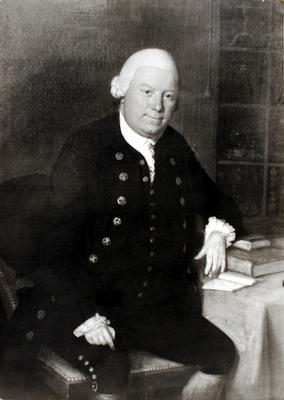
A portrait painted c 1775 of John Anderson (1726-1796), founder of Anderson's University.
Anderson was born in Dunbartonshire. He attended the University of Glasgow, graduating in 1745. He enlisted as a volunteer officer during the Jacobite Rebellion of 1745-1746 and in 1755 was appointed Professor of Oriental Languages at the University of Glasgow. In 1757 he transferred to the Chair of Natural Philosophy.
Affectionately known as "Jolly Jack Phosphorus" to his students, Anderson often became involved in quarrels, and even legal disputes, with his colleagues. He developed the popular "Experimental Philosophy" evening class, a course advertised in the newspapers and available to the working classes. In 1786 he published a book, The Institutes of Physics, to help his students. It ran to five editions in ten years.
Anderson's will outlined the foundation of "Anderson's University", stipulating that no one associated with the University of Glasgow would be employed and that women would have the opportunity to attend lectures. The University was to be managed by eighty-one trustees of various occupations, and they were able to establish "Anderson's Institution" in 1796.
Reference: P4/1/2
Reproduced with the permission of Strathclyde University Archives
Keywords:
Anderson's Institution, Anderson's University, ballistics, evening classes, experimental philosophy, Jacobite Rebellion, 1745, natural philosophy, physics, portraits, professors, University of Glasgow, volunteers, wills, women students
You have 43 images in your photo album.